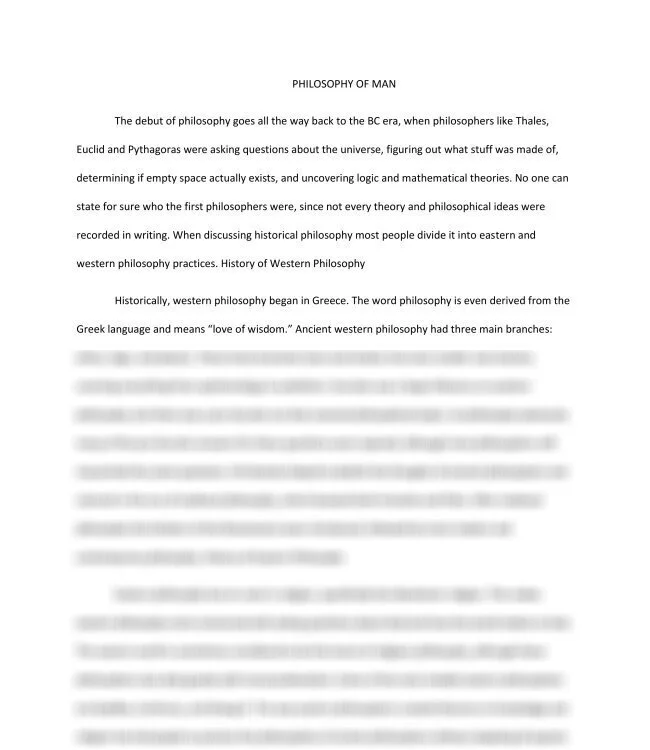PHILOSOPHY OF MAN
PHILOSOPHY OF MAN
---------------------------------- -a -specific -the 1. 2. A. Abrahamic After All Ancient Aristotle As B. BC Buddha, Buddhism, C. Can Christianity Confucius, Contemporary Cosmology D. Eastern Epistemology Ethics Euclid General Given God God. Greece. Greek Hinduism, Historically, History However, In Islam It It’s Legalism. Logic MAN Man Maoism, Metaphysics No OF Ontology Over Philosophy Philosophy, Plato. Psychology Pythagoras Renaissance Science Shinto, Socrates Some Special Taoism, Thales, The Theodicy There These This Through Various We Western What When Zhang Zi. a a. abolish about abstract abstract, activities, actually adopting advanced, aesthetics. all also although amount an ancient and answers are as asking asks, aspect. aspects assess attempts attribute attribute, b. back be because been began being, being. belief believed benevolent between boasted body. both branch branch. branches branches. branches: broke broken but by c. can capable causes certain certainty chose common complete concerned consider considered constitutes contemporary correct covered covering created current data. deal dealing deals debated. debut deceive decidedly deepest derived destiny determining differences different discarded, discipline. discovery discussing divide do don’t drop dropped? e eastern embrace emerge. emotions, empirical empty epistemology era era, ethics, evaluation even every everything evil examines example, existence exists, experiences, explain extent fact fall feeling. figuring first five followed for form formal foundations, four from functions general goes greatly ground ground? had has have he helped his historical historically home how however, hypotheses, ideas if impacted important in include: including indeed influence inquiry; insights. instance, into introduced, is it its just know knowledge knowledge, language large led level levels. life like logic logic, made made. main makes man man, man. many material mathematical matter, meaning means medieval metaphysics might mind mind, modern moral morally more most much nature nature, new next not notable now object? objects, of of, often omnipotent, omniscient, on onPHILOSOPHY one ones opposite or origin, our out outside overview overview, part part. people phenomena philosopher,” philosophers philosophical philosophies philosophizes philosophizes, philosophy philosophy, philosophy. physical physics. place practice practices practices. pre-Socratic premise, present present. presuppositions principles; probe processes progress pursuit questions questions. rather rational reality, reasoned reasoning. reconcile recorded regions rejected, relates relations relationship religion religion, religion. religious remove representation researched respect, retained. retesting right rigor rigorous roots same science science, secure see see, seeks seem seems self-evident senses simply since six smaller some someone sometimes sort soul, space specifically speculation. state still structure studies study stuff sub-sections, substance such suffering sure systematic take taken tends testing than that that’s the their them. then, theology theoretical theories theories. theory there these thing things things, thinkers thinking thinking; this thought thoughts three time, to topics. towards transcendentalism. two uncovering understanding universe, universe. unsatisfactory us used ushered validity. value. was way we were were, western what when which while who why? will wisdom.” with within without word world world, world. writing. wrong. “born “love
PHILOSOPHY OF MAN
The debut of philosophy goes all the way back to the BC era, when philosophers like Thales, Euclid and Pythagoras were asking questions about the universe, figuring out what stuff was made of, determining if empty space actually exists, and uncovering logic and mathematical theories. No one can state for sure who the first philosophers were, since not every theory and philosophical ideas were recorded in writing. When discussing historical philosophy most people divide it into eastern and western philosophy practices. History of Western Philosophy
Historically, western philosophy began in Greece. The word philosophy is even derived from the Greek language and means “love of wisdom.” Ancient western philosophy had three main branches: ethics, logic, and physics. These three branches have now broken into even smaller sub-sections, covering everything from epistemology to aesthetics. Socrates was a large influence on western philosophy, but there was a pre-Socratic era that covered philosophical topics. As philosophy
